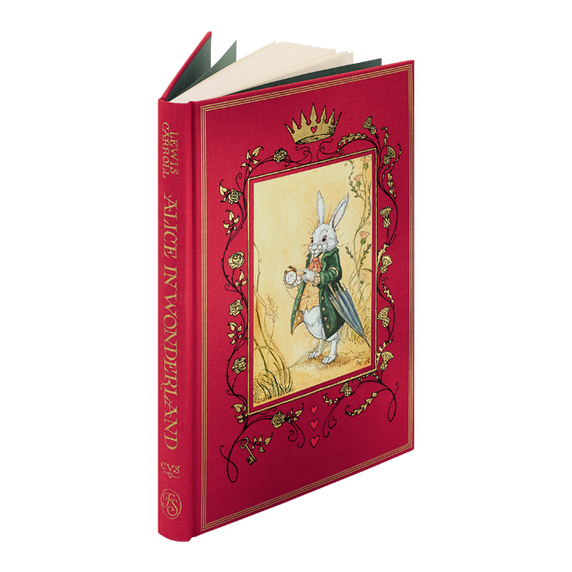
The Folio Society presents a glorious new edition of Lewis Carroll’s immortal tale, illustrated by acclaimed artist Charles van Sandwyk.
Or How Toys Become Real
Illustrated by William Nicholson
Introduced by Shirley Hughes
Afterword by Marilynn Strasser Olson
Margery Williams’s affectionate tale of enduring love, The Velveteen Rabbit, has been faithfully reproduced in this beautifully designed new Folio collector’s edition.
Written in 1922, this touching tale of a cloth rabbit’s quest to become ‘Real’ is a masterpiece among children’s illustrated books. With its nostalgic nod to the fairy-tale tradition, it has inspired many fantastical tales about talking toys and remains a bedtime favourite almost 100 years later.
William Nicholson’s artwork is as memorable as the story, so we worked closely with the artist’s grandson Desmond Banks from the outset. We returned to the first edition to create a charming reproduction of every page, as well as individually restoring Nicholson’s illustrations to their original splendour. This painstaking attention to detail has resulted in a truly beautiful and collectable book that will delight younger readers for generations to come.
Bound in blocked cloth
Set in Founder’s Caslon
64 pages
7 colour illustrations, including 3 double-page spreads
Hand-drawn dedication page reproduced from William Nicholson’s daughter’s original copy
Printed endpapers
Blocked slipcase
10˝ x 7½˝
When the little Velveteen Rabbit arrives in the Boy’s Christmas stocking, he is the favourite present by far. But children can be fickle and it isn’t long before the shy soft toy is abandoned to his fate among the bigger and flashier mechanical and wooden toys in the nursery. Only the threadbare horse pays him any attention and shares the secret of how to become ‘Real’.
When a child loves you for a long, long time, not just to play with, but REALLY loves you, then you become Real.
A twist of fate eventually returns the rabbit to the boy’s affections and it’s just a matter of time before his wish is granted. However, instead of finding the happiness he has dreamed of for so long, the Velveteen Rabbit’s adventures are only just beginning.
From the vivid period endpapers that are recreated from the first edition to the gold-blocked slipcase featuring a beautiful line-drawn pattern of rabbits, the Folio edition is full of extraordinary design details that make it truly unique. But perhaps most special of all is a dedication and pencil sketch from Nicholson to his daughter Penny. Exclusive to our edition, the page is reproduced from her personal copy of The Velveteen Rabbit and includes a gorgeous pencil drawing.
Nicholson’s work is widely appreciated and Shirley Hughes has a particular admiration for the late artist. Herself a children’s author and illustrator, Hughes takes a closer look at his artistic connection to this story in her moving introduction. Meanwhile, the distinguished children’s literature professor Marilyn Strasser Olson expands on the perfect symmetry between the story and the illustrations – which has kept the book in readers’ affections for more than a century.
Margery Williams was born in London in 1881. A professional writer from the age of 19, she tried various approaches, writing or translating novels and short stories, adult horror, children’s tales and young adult books. Success came, following a move to the US in 1921, with the publication of The Velveteen Rabbit (1922), her first book for young children. Her 30 subsequent works for children display her trademark touches of sadness and sentimentality, perhaps traceable to her beloved father’s death when she was seven. Winterbound (1937) was retroactively awarded a Newbery Honor – but it was The Velveteen Rabbit that made Williams famous. Republished numerous times around the world, it has been adapted for cinema and television, and into several musicals.
William Nicholson was born in Newark-on-Trent, Nottinghamshire, in 1872. After studies at Herkomer’s School in Bushey and the Académie Julian in Paris, he formed a partnership with James Pryde, ‘J. & W. Beggarstaff’, designing posters and graphic works. He soon became a successful and celebrated artist in his own right, painting still-lifes, landscapes and portraits. He also worked as a wood-engraver, an illustrator and a designer for the theatre. In 1904 he designed the set for the original theatre production of Peter Pan. In addition to illustrating The Velveteen Rabbit, Nicholson provided illustrations and cover designs for several books by his son-in-law Robert Graves, and wrote and illustrated his own two children’s books, Clever Bill (1926) and The Pirate Twins (1929). He was knighted in 1936.
Shirley Hughes is one of the most respected children’s writers and illustrators working today. She studied at Liverpool Art School and Oxford. Her first picture book, Lucy and Tom’s Day, was published in 1960. Her stories reflect her observation of the joys and drama of everyday life, and her books for young children include the much-loved Alfie series and Dogger (1977). She has also written and illustrated visually adventurous books, such as The Lion and the Unicorn (1988), for older children and wartime fiction for teenagers. She has illustrated over 200 books and won both the Kate Greenaway Medal and the Eleanor Farjeon Award. In 2016 Hughes was honoured with a CBE for her distinguished services to children’s literature.
Marilynn Strasser Olson is Professor of English and Director of Advanced Studies at Texas State University, and a past editor of the Children’s Literature Association Quarterly. She discusses William Nicholson in Children’s Culture and the Avant-Garde: Painting in Paris 1890–1915 (2012), as well as in briefer articles on art in picture books.
